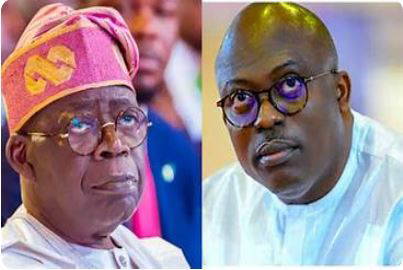
The political crisis in Rivers State has entered a critical phase as suspended Governor Siminalayi Fubara makes concerted efforts to mend fences with his former mentor, Federal Capital Territory Minister Nyesom Wike. This comes nearly two months after President Bola Tinubu declared a state of emergency in the state on March 18, 2025, stripping Fubara of executive powers following escalating tensions between the two political camps.
Sources close to the matter reveal that Fubara traveled to Abuja on April 18 for a private meeting with Wike at the minister’s residence. The suspended governor was accompanied by several prominent Yoruba political figures including Ogun State Governor Dapo Abiodun and former Governor Segun Osoba, a strategic move seen as bypassing Rivers elders who had been advising Fubara during the conflict. This delegation choice underscores the complex political dynamics at play, with Wike having previously accused certain Rivers elders of fueling the crisis for their own interests.
The roots of the current impasse trace back to the 2023 general elections when Wike, then serving as Rivers governor, handpicked Fubara as his successor despite opposition from several PDP stalwarts in the state. These party elders, including former PDP National Chairman Uche Secondus and ex-Deputy Governor Tele Ikuru, had supported Atiku Abubakar’s presidential bid against Wike’s preferred candidate. After initially retreating to Abuja during the elections, these political figures returned to Port Harcourt following Wike’s appointment as FCT Minister and reportedly encouraged Fubara to assert his independence.
President Tinubu’s intervention through the state of emergency declaration came at a critical juncture, preventing what many believed would be Fubara’s imminent impeachment by the state assembly. The suspension has left Rivers in administrative limbo, with growing calls from various quarters for the restoration of democratic governance.
In recent weeks, Fubara appears to have shifted strategy, making conciliatory gestures toward both Wike and President Tinubu. The suspended governor reportedly met with Tinubu during a private trip to London, though details of their discussion remain confidential. This was followed by his emotional appeal to Wike in Abuja, where he sought forgiveness for their political fallout. Observers note that Wike had previously stated publicly that he would be willing to reconcile if Fubara showed genuine remorse.
The potential resolution has sparked mixed reactions across Rivers State and beyond. Prominent voices from the Ijaw community, including Ann Kio Briggs of the Ijaw Republican Assembly and Professor Benjamin Okaba of the Ijaw National Congress, have called for Fubara’s reinstatement on May 29 to coincide with Nigeria’s Democracy Day celebrations. They argue this would bring much-needed stability to the oil-rich state and demonstrate Tinubu’s commitment to democratic principles.
However, questions remain about what concessions Fubara may have made in these behind-the-scenes negotiations. Political insiders suggest any return to office would likely come with significant conditions, including a power-sharing arrangement for key appointments and influence over upcoming local government elections. There are concerns that Fubara might return as a weakened executive, with real decision-making power resting elsewhere.
As the May 29 deadline approaches, all eyes are on Abuja for signals about the political future of Rivers State. The outcome will not only determine Fubara’s political survival but could also set important precedents for how such crises are managed in Nigeria’s complex federal system. The situation remains fluid, with the potential to either restore normalcy or deepen the existing political divisions in one of Nigeria’s most strategically important states.






